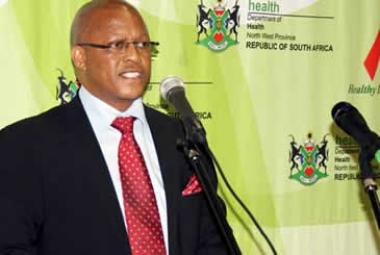North West plans to refurbish primary Healthcare System
 North West Health MEC Dr Magome Masike
North West Health MEC Dr Magome Masike
The North West Health Department will this financial year launch Primary Healthcare Re-engineering to substantially improve waiting times and reduce the workload in the system, Health MEC Dr Magome Masike announced.
Presenting the department's R6 959 308 budget vote and policy speech on Tuesday for the 2012/13 financial year, Masike said Primary Healthcare (PHC) Re-engineering was about improving the quality of care given to citizens.
He noted that public health studies have shown that out of 100 patients, only five need to see a doctor and 40% - 60% of patients seen in hospitals could receive optimal care at PHC level.
"The implementation of this massive programme is in motion and our foot soldiers are already on the ground doing work and changing lives. There is hope and our people are beginning to see what we mean when we talk about taking healthcare services closer to them," Masike said.
Efforts to reduce maternal and child death were still a high priority for the department. Masike was concerned about the significant proportion of women (about 16%), who currently delivered babies outside health facilities. He committed his department to intensify efforts to improve delivery within healthcare facilities, so that mothers have access to professional healthcare during delivery.
The department has also prioritised purchasing obstetric ambulances, which will be used to transport women who are in labour to facilities with maternity services. Paediatric services will also be improved.
"Integrated management of childhood illnesses remains a key strategy for managing our children and we will now put more emphasis on monitoring implementation," Masike said, adding that the department intended to roll out a programme to identify health problems in children at all hospitals where children are managed.
Basic antenatal care (BAC) sites will be increased from 169 to 219.
In a bid to improve response time, the department was planning to establish and fund the Emergency Medical Rescue Services (EMRS).
"We are on course to re-engineer emergency medical services by training, discipline, access and communication to improve the response times of ambulances to all communities to be in line with national targets.
"National Treasury has just awarded a tender for aeromedical services, which is going to be used for specialised services in remote areas... Some of our patients in remote areas are in urgent need of specialised services. A specialist will be sent to them via aeromedical services," said Masike.
Focus will also be on reviving school healthcare services and sending outreach teams to patients' homes. This, Masike said, would substantially improve waiting times and reduce the workload at the secondary level of care.

















